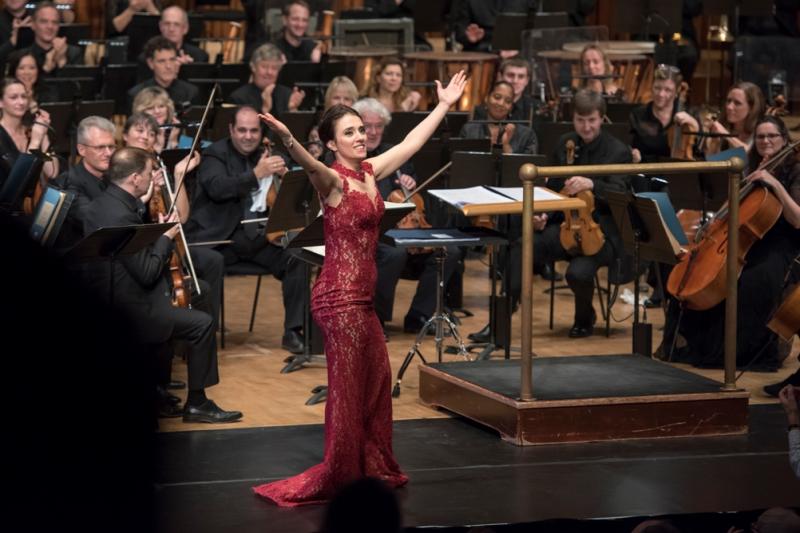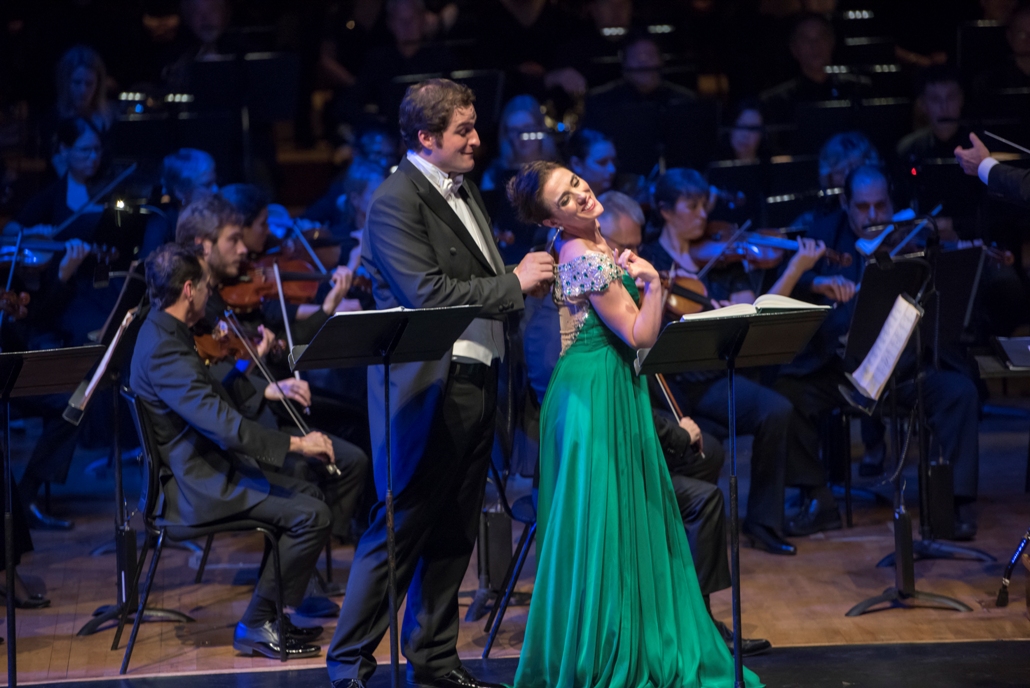Zazà, BBCSO, Benini, Barbican | reviews, news & interviews
Zazà, BBCSO, Benini, Barbican
Zazà, BBCSO, Benini, Barbican
A diva in full spate captures the true Italianate thrill of Leoncavallo's thoughtful curiosity

Send in the clowns, as they sing in this palace-of-varieties first act, not for Pagliacci, Leoncavallo’s sole foothold on today’s operatic repertoire, but for the fool-for-love heroine of a sparkling, swooning rarity. Musically, Zazà is a notch above Mascagni and Giordano for orchestral delights, just below supreme genius Puccini, but its admittedly thinly-spread plot ends by being rather remarkable.
Having powered through with a sense of flaming indignation and a lyric voice that soars in true Italianate style, the like of which we haven’t heard since Angela Gheorghiu and Anja Harteros first hit the heights, Albanian soprano Ermonela Jaho seemed drained and surprised by what she’d achieved. Had her Royal Opera Suor Angelica four years ago still been in fledging mode, or hadn’t I appreciated the replacement for the keenly anticipated Harteros? Well, we'll see when she returns in the revival next year, but certainly her Zazà in concert was the real deal. There are vocal flaws, certainly: in order perhaps not to cut off any kind of artificial chest voice from the rest of the instrument, Jaho underprojected the lower notes, and the top could go sharp; still, better that in excitement than flat and underenergised. In any case all this could easily be forgiven for the supple movements, the looks, the warm flights into the stratosphere, the hundred and ten per cent of the final scene.
Other pleasures kept level pegging until Jaho's ultimate pulling out of all the stops. Experienced conductor Maurizio Benini had the right controlled sensuousness for Leoncavallo’s poise between Neapolitan passion and neoclassical elegance. Under him the BBC Symphony Orchestra sounded nimble in the first act’s variety turns – if a little loud, as if he hadn’t properly gauged the Barbican’s amplifying properties – and fabulously delicate in the third, where Leoncavallo assumes the delicately sentimental manner of Massenet for the little girl of the bourgeois household whose peace of mind Zazà decides not to disturb.

The score is full of delights sweepingly big and tellingly small (like leader Stephen Bryant’s downward chromatic run to depict an unzipping in a dressing-room). It can follow the Puccini manner, if not quite the great Puccini tune, in the warm lover’s music of the cad, Dufresne, sung with totally idiomatic Italian-tenor ardour by Riccardo Massi (pictured above with Jaho and BBCSO players). The two most memorable set-pieces, surely, belong to the sympathetic baritone, Zazà’s fellow singer, career-launcher and one-time lover Cascart; stepping in at shortish notice, Met regular Stephen Gaertner did them opulently proud.
At even shorter notice - 24 hours, apparently - mezzo from the BBC Singers Rebecca Lodge gamely made sure the show went on with her virtual sight-reading in the role of Anaide, the inebriate mother for whom Zazà shows intuitive understanding in amongst the bitterness. Among the many cameo roles, Kathryn Rudge, David Stout and Nicky Spence held their heads high alongside the stars. "Director" Susannah Waters couldn't be expected to do much when scores and stands were in use throughout, but there was neat contrast between the vaudeville stage and the same platform used to display a piano on which Dufresne's sweet daughter Totò "plays" the Cherubini Ave Maria in Act Three.
With only one half-cock Italian recording of Zazà in the CD catalogue, Opera Rara’s choice in setting down Leoncavallo's 1919 revision of the already finely-drawn 1900 original for 2016 release is an astute one. There’s only one snag; the performance had already been captured in the studio before this concert. And given how Jaho burned before a spellbound audience in the final scene, the company may now be regretting that there weren’t mikes in the Barbican too to splice in the most explosive moments (hard to match acoustics, no doubt, if I'm right in assuming Maida Vale as the first venue).
There’s nothing like Italian opera when the performance is all-engulfing. It doesn’t happen often, but it happened here on Friday night, giving Jaho artist of the year status alongside Tamara Wilson’s astounding London debut as Verdi's Leonora in the ENO Force of Destiny. Yes, it’s been a good 11 months for opera in London, and there's still December to go.
The future of Arts Journalism
You can stop theartsdesk.com closing!
We urgently need financing to survive. Our fundraising drive has thus far raised £49,000 but we need to reach £100,000 or we will be forced to close. Please contribute here: https://gofund.me/c3f6033d
And if you can forward this information to anyone who might assist, we’d be grateful.

Subscribe to theartsdesk.com
Thank you for continuing to read our work on theartsdesk.com. For unlimited access to every article in its entirety, including our archive of more than 15,000 pieces, we're asking for £5 per month or £40 per year. We feel it's a very good deal, and hope you do too.
To take a subscription now simply click here.
And if you're looking for that extra gift for a friend or family member, why not treat them to a theartsdesk.com gift subscription?
more Opera
 Albert Herring, English National Opera review - a great comedy with depths fully realised
Britten’s delight was never made for the Coliseum, but it works on its first outing there
Albert Herring, English National Opera review - a great comedy with depths fully realised
Britten’s delight was never made for the Coliseum, but it works on its first outing there
 Carmen, English National Opera review - not quite dangerous
Hopes for Niamh O’Sullivan only partly fulfilled, though much good singing throughout
Carmen, English National Opera review - not quite dangerous
Hopes for Niamh O’Sullivan only partly fulfilled, though much good singing throughout
 Giustino, Linbury Theatre review - a stylish account of a slight opera
Gods, mortals and monsters do battle in Handel's charming drama
Giustino, Linbury Theatre review - a stylish account of a slight opera
Gods, mortals and monsters do battle in Handel's charming drama
 Susanna, Opera North review - hybrid staging of a Handel oratorio
Dance and signing complement outstanding singing in a story of virtue rewarded
Susanna, Opera North review - hybrid staging of a Handel oratorio
Dance and signing complement outstanding singing in a story of virtue rewarded
 Ariodante, Opéra Garnier, Paris review - a blast of Baroque beauty
A near-perfect night at the opera
Ariodante, Opéra Garnier, Paris review - a blast of Baroque beauty
A near-perfect night at the opera
 Cinderella/La Cenerentola, English National Opera review - the truth behind the tinsel
Appealing performances cut through hyperactive stagecraft
Cinderella/La Cenerentola, English National Opera review - the truth behind the tinsel
Appealing performances cut through hyperactive stagecraft
 Tosca, Royal Opera review - Ailyn Pérez steps in as the most vivid of divas
Jakub Hrůša’s multicoloured Puccini last night found a soprano to match
Tosca, Royal Opera review - Ailyn Pérez steps in as the most vivid of divas
Jakub Hrůša’s multicoloured Puccini last night found a soprano to match
 Tosca, Welsh National Opera review - a great company reduced to brilliance
The old warhorse made special by the basics
Tosca, Welsh National Opera review - a great company reduced to brilliance
The old warhorse made special by the basics
 BBC Proms: The Marriage of Figaro, Glyndebourne Festival review - merriment and menace
Strong Proms transfer for a robust and affecting show
BBC Proms: The Marriage of Figaro, Glyndebourne Festival review - merriment and menace
Strong Proms transfer for a robust and affecting show
 BBC Proms: Suor Angelica, LSO, Pappano review - earthly passion, heavenly grief
A Sister to remember blesses Puccini's convent tragedy
BBC Proms: Suor Angelica, LSO, Pappano review - earthly passion, heavenly grief
A Sister to remember blesses Puccini's convent tragedy
 Orpheus and Eurydice, Opera Queensland/SCO, Edinburgh International Festival 2025 review - dazzling, but distracting
Eye-popping acrobatics don’t always assist in Gluck’s quest for operatic truth
Orpheus and Eurydice, Opera Queensland/SCO, Edinburgh International Festival 2025 review - dazzling, but distracting
Eye-popping acrobatics don’t always assist in Gluck’s quest for operatic truth
 MARS, Irish National Opera review - silly space oddity with fun stretches
Cast, orchestra and production give Jennifer Walshe’s bold collage their all
MARS, Irish National Opera review - silly space oddity with fun stretches
Cast, orchestra and production give Jennifer Walshe’s bold collage their all

Add comment